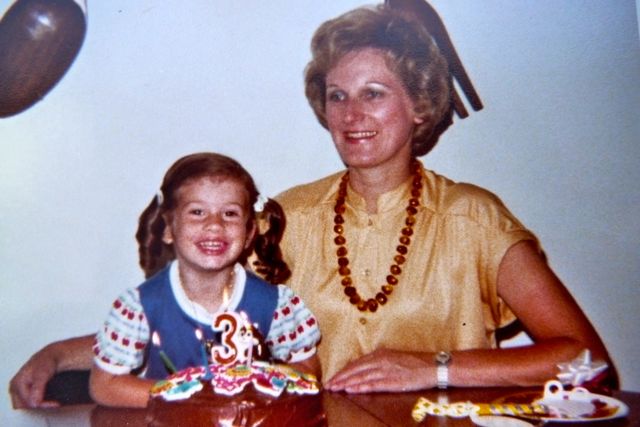I watched this video from a poetry slam the other day, and it left me in tears.
Poet Lily Myers talks about body image and how it affected the women in her family, especially her mother: “Nights I’d hear her creep down to eat plain yogurt in the dark, a fugitive stealing calories to which she does not feel entitled, deciding how many bites is too many, how much space she deserves to occupy.”
My mom was strong and tall, a German woman who survived World War II by walking over a frozen lake. She could do anything — open stuck pickle jars, lift all the bags of groceries at once, push me higher than any other kid on the swingset. One time my plastic digital watch stopped working, and my mom slapped it across her palm so forcefully that it turned her hand pink. “Just needs a good German touch,” she said, as the digital numbers reappeared.
As much as her body could do, my mom was never satisfied with it. My house was a world of weekly weigh-ins, diet gum and Tab. I don’t remember my mom eating bread, only thin Wasa crackers at 35 calories each. Sometimes she binged on candy, then immediately berated herself. She was hungry for years, skipping breakfast and only eating the tiniest of lunches. This magnificent, accomplished woman was consumed by her own consumption.
It’s strange. I loved my mom because she was elegant and exotic. She tucked me into bed every night and whispered prayers in other languages. She was proud and loyal and she loved me fiercely. I don’t remember the shape of her thighs or the roundness of her belly. I remember her crinkled fingers that felt for fever on my forehead. I remember the arms that held me. The swoop of her freckled shoulder.
You could say my mom died of Alzheimer’s Disease, which is what gnawed away at her mind and body for 10 years. But really she died of starvation, which is a terrible irony. In the final stages of Alzheimer’s, my mom’s brain could no longer send signals to her organs, so her body couldn’t process food anymore. My family decided a long time ago that we did not want to prolong her life with feeding tubes, and eventually her body shut down. In her final days, she had been whittled down to a thin, pale shape. And she was beautiful.
That’s the awful thing. When I looked in my mom’s coffin at her funeral, my first thought was, “Wow. She would be so happy.” She was finally skinny. She would’ve loved that.
Somewhere along the line, I picked up these unhealthy thoughts and made them my own. I’ll eat something delicious, then complain to my friends that I’ve been “so bad.” I do regular detoxes and cleanses, the more modern, acceptable version of diets. And I look with longing at tiny, slim-boned women, and I wonder how wonderful it must feel to be so small.
Now my husband and I are trying to start a family, and he says he hopes we never have a girl. “I don’t want a daughter to grow up with your body issues,” he says, a comment that is so distressing in its truth. I could be one bad-ass mother to a girl — and instead I want to be small? Why not focus on being substantial? Something is very wrong here.
As that poet says, “I wonder if my lineage is one of women shrinking.” I wonder if my lineage could become one of women who are larger than life.

